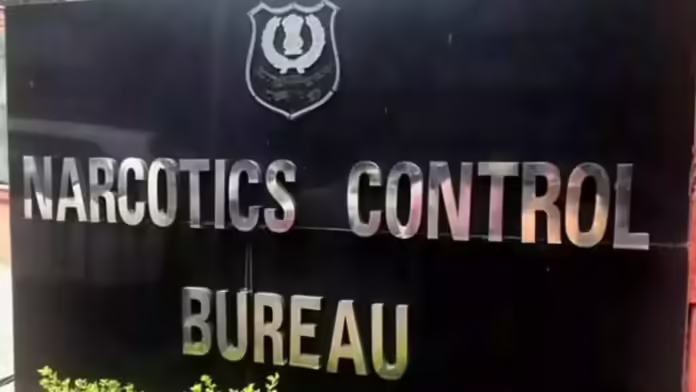The Indian agency Narcotics Control Bureau, which functions under the Ministry of Home Affairs (MHA), played a pivotal role in a global anti-drug operation, “Operation Med Max” that was launched in May 2025 and which is being termed as one of the most far-reaching international crackdowns on a tech-driven drug trafficking syndicate distributing controlled pharmaceutical substances like Tramadol and Zolpidem across Asia, North America, Europe, and Australia.
Operation Med Max spanned four continents— Asia, North America, Europe, and Australia—and involved law enforcement cooperation across at least seven confirmed countries: India, the United States, Australia, the United Arab Emirates, Estonia, Spain, and Switzerland. While the core operations were centred in India, the syndicate’s supply chains and delivery networks extended into North America, Europe, and Oceania. Intelligence inputs and investigative coordination point to the likelihood of additional, unnamed jurisdictions being involved, particularly within Europe and the Middle East. The global nature of the trafficking network was reflected not only in its reach but also in the diversity of enforcement agencies engaged in its disruption.
MULTI-AGENCY COORDINATION ACROSS CONTINENTS
The operation was led by India’s Narcotics Control Bureau (NCB), working in close partnership with the U.S. Drug Enforcement Administration (DEA), the Australian Federal Police (AFP), Interpol, and law enforcement and financial surveillance agencies in the UAE, including the Dubai Police and the UAE Financial Intelligence Unit. The U.S. Treasury’s Financial Crimes Enforcement Network (FinCEN) played a crucial role in tracing international financial flows linked to drug payments routed through cryptocurrency, PayPal, and hawala channels. Custom and postal inspection agencies in Europe also contributed by intercepting consignments and conducting forensic parcel screening. Altogether, at least seven core agencies were actively involved, backed by supporting entities at the local and international levels.
On Wednesday, Home Minister Amit Shah congratulated the NCB and all agencies on busting the global drug cartel. In a post on X platform, Shah wrote, “Congratulations to NCB and all agencies on busting a global drug cartel. The probe set a stellar example of multi-agency coordination, resulting in 8 arrests and seizures of 5 consignments while triggering crackdowns in the US and Australia against the ring that operates across 4 continents and 10+ nations. Our agencies are constantly monitoring the sophisticated modes like crypto payments and anonymous drop shippers used by these gangs. PM Shri Narendra Modi Ji-led govt is determined to saw off every drug cartel and protect our youth, no matter where they operate from.”
SEIZURES AND ARRESTS ACROSS JURISDICTIONS
Details shared with this newspaper by official agencies show that so far, the crackdown has led to the seizure of more than 20,000 tablets, including over 17,000 Tramadol tablets and 700 grams of Zolpidem in the United States alone, with an additional 3.7 kilograms of Tramadol seized in New Delhi and unspecified quantities recovered from a clandestine pill-manufacturing facility in Australia. Authorities also intercepted parcels in Switzerland and other EU ports, although precise volumes remain undisclosed. A total of ten individuals have been arrested—eight in India and two in the U.S.—with at least eleven persons identified or implicated. These include Joel Hall in Alabama, an Indian-American financier indicted for laundering drug proceeds, and a UAEbased kingpin whose identity has been confirmed but who remains at large. As per official sources, while some part of the investigations still remains open, these arrests and seizures have significantly disrupted the operational backbone of the syndicate.
The syndicate relied on encrypted messaging platforms such as Telegram, cryptocurrency payments, hawala transactions, and international dropshipping models to avoid detection, pointing to the increasing convergence between digital anonymity tools and illicit global logistics. THE CASE THAT TRIGGERED OPERATION MED MAX The case began on 25 May 2025, when NCB officers from its headquarters unit in New Delhi intercepted a vehicle near Bengali Market, close to Mandi House, on the basis of prior inputs.
The occupants, two young men holding Bachelor of Pharmacy degrees from a private university in Noida, were found carrying 3.7 kilograms of Tramadol tablets. Their subsequent interrogation revealed that they had been running a vendor profile on a leading Indian B2B e-commerce platform, selling controlled medicines to buyers in the United States, Australia, and parts of Europe, an official involved in the initial phase of this operation told The Sunday Guardian.
This small seizure unravelled an intricate web of international drug trafficking that had operated largely undetected across four continents. The information obtained from their confession led investigators to identify 50 international consignments: 29 to the United States, 18 to Australia, and one each to Estonia, Spain, and Switzerland. These were routed through international re-shippers, with local nodes across India handling procurement, order processing, and logistics. The NCB shared intelligence with its global counterparts, triggering simultaneous operations abroad, on an unprecedented scale, as the official quoted above recalled.
JOEL HALL: A LINK TO AN EARLIER U.S. DRUG CASE
Among the central figures to emerge from these international arrests was Joel Hall, a U.S. national based in Alabama. He served as a key re-shipper for the syndicate, receiving bulk pharmaceutical consignments from India and redistributing them across the United States, including New Jersey and New York. A raid conducted by the DEA’s Alabama field unit led to the recovery of over 17,000 tablets, primarily Tramadol, along with 700 grams of Zolpidem and several active parcels ready for dispatch. Multiple cryptocurrency wallets were also seized, revealing how the syndicate was blending physical logistics with decentralized finance.
As per The Sunday Guardian’s investigation, there is credible reason to believe that Joel Hall is the same individual who was arrested in Norwich, Connecticut, in 2019 and sentenced to four years in federal prison for distributing cocaine and crack cocaine. That sentence, issued in December 2019, likely ended around April 2023 after accounting for time served from his April 2019 arrest. This timeline aligns closely with the start of his suspected involvement in the Alabama leg of the Med Max operation. It is believed that following his release from federal custody, he relocated to Alabama and got involved in a high-value logistics node. While there is no official confirmation yet linking the two identities, the overlap in name, criminal background, logistical role, and timeline suggests a strong operational continuity.
FINANCIAL LINKS AND UAE CONNECTION
Hall’s arrest is seen as a huge breakthrough for U.S. enforcement agencies, who believe he was a key operational link between Indian exporters and the American domestic market. The cryptocurrency wallets recovered during his arrest are still under investigation, with efforts underway to map transactions across multiple digital platforms. Another major actor identified during the course of the investigation is an Indian-American individual, currently unnamed, who has been indicted in a U.S. federal court for laundering proceeds from drug sales using a combination of cryptocurrency, PayPal, Western Union, and traditional hawala channels.
This individual is believed to have facilitated payments for the 29 U.S.- bound consignments, deducting a 10-15% commission from each transaction before routing the remainder to the syndicate’s suppliers and re-shippers. The unnamed individual, as per The Sunday Guardian’s investigation is likely to be an individual named “Manthan Rohit Shah”. A 12 June Department of Justice (DOJ) indictment named Shah for operating an illicit online pharmacy that sent controlled substances—including Tramadol and Zopiclone—into the U.S., and laundering the proceeds through shell companies and cryptocurrency-controlled accounts. Shah, 37, of Mumbai, was charged for conspiring with others to direct the shipment of pharmaceutical drugs for a network of online pharmacies and call centres that fulfilled orders placed by customers in the United States and elsewhere. He further provided fake prescriptions to make the otherwise illegal drugs appear legitimate for import into the United States. Shah then conspired with others to launder the funds from financial accounts in the United States to accounts abroad.
The U.S. Treasury’s Financial Crimes Enforcement Network (FinCEN) is working with the DEA to trace additional financial trails, including offshore accounts suspected to be based in the UAE. Another lead emerging from the intelligence trail points to a UAE-based kingpin who is believed to have orchestrated the syndicate’s financial and operational structure. This individual, who operated primarily from either Dubai or Abu Dhabi, used encrypted communications to manage orders, payments, and re-shipper assignments. Though not yet apprehended, the person’s identity is known to Indian authorities, who are working with UAE agencies including the Dubai Police and the nation’s Financial Intelligence Unit. The individual’s reliance on cryptocurrency, hawala, and international couriers allowed them to move millions of dollars annually without triggering alerts from conventional banking systems.
DOMESTIC NODES AND THE UDUPI HUB
The Indian end of the syndicate’s operations revolved around a tightly compartmentalized network spread across Delhi, Uttarakhand, Karnataka, and Rajasthan. In total, eight arrests were made within India. Among them were the two B.Pharma graduates from Delhi, whose 25 May arrest triggered the operation. They had set up what appeared to be a legitimate pharmaceutical vendor page on an Indian B2B platform and were processing bulk orders from overseas. Investigators then tracked a drug stockist based in Roorkee, Uttarakhand, who handled inventory and shipments, ensuring the material never originated from the same state to avoid detection. A key associate operating from Mayur Vihar in East Delhi provided links to a handler in Udupi, Karnataka.
The Udupi contact turned out to be one of the most critical nodes in the entire network. Investigators found a fully functional call centre with 10 staff members who handled sales inquiries, payment processing, and consignment tracking for international buyers. Several employees were reportedly unaware that the products being shipped were scheduled pharmaceutical drugs, believing they were working in a conventional pharma BPO setup. Orders were routed via encrypted chats, and transactions were logged using basic enterprise resource tools masked as pharma order management dashboards. Two additional arrests— one in Delhi and another in Jaipur—were tied to the logistics side of the operation. These individuals ensured that drugs were packaged in consumer-grade boxes, often mislabelled or hidden within innocuous items, and dispatched through international couriers that would eventually hand off to re-shippers in North America and Europe. Notably, none of the operatives dispatched parcels from their own residential areas or states, a tactic that investigators say was part of a broader operational manual shared within the network to minimize traceability.
AUSTRALIA AND EUROPE: EXPANDING THE FOOTPRINT
While the Indian network was clearly the production and coordination hub, the Australian wing functioned as a regional selfreliant unit. Acting on intelligence shared by the NCB, the AFP raided and dismantled a clandestine pillmanufacturing facility suspected to be producing Tramadol and other similar medications for both local consumption and reexport. The facility was reportedly tied to 18 consignments traced back to the broader syndicate’s routing system. While no individual names were released by Australian authorities, ongoing investigations are focusing on local stockists and small-scale re-shippers who were allegedly recruited to expand the operation’s reach organically within the country. In Europe, the footprint appeared lighter but no less sophisticated. Authorities confirmed that the syndicate shipped one consignment each to Estonia, Spain, and Switzerland. The Swiss parcel was intercepted by customs, where Tramadol tablets were discovered concealed inside packaged consumer goods. Interpol, sources said, is currently working with national law enforcement in these countries to trace the end receivers of the drugs. While no arrests have been reported in the European segment so far, investigators believe the receivers were likely re-shippers operating independently but plugged into the same encrypted communication and payment systems used across the network.
DIGITAL TRAFFICKING MODEL
According to officials, each component of the syndicate’s operation was marked by a distinct blend of digital concealment and logistical sophistication. The premium vendor page on the Indian e-commerce platform served as a storefront to establish credibility. Communication took place almost exclusively over Telegram using rotating handles and timebound encryption settings. Orders were tracked using custom dashboards accessible only through tokenized URLs. Payments, meanwhile, were split across channels: cryptocurrency wallets for bulk buyers, PayPal and Western Union for individual orders, and hawala transfers for syndicate-level settlements. The financial structure was designed to fragment oversight. When a buyer placed an order, the orders module would deduct a 10- 15% service fee before routing the payment to the supply node. The supply node retained an additional cut before sending the balance to either re-shippers or distributors, depending on the shipment’s geography. This multi-layered process ensured that no single operative had visibility into the entire pipeline. Even within the Udupi call centre, the staff handling orders were not the same as those managing payment verification or shipment planning. Packaging and routing were similarly anonymized. Indian operatives never used their own addresses or even local drop points. Parcels were frequently routed through rented storage lockers, independent third-party shippers, or co-opted individuals unaware of the contents. In the U.S., re-shippers like Joel Hall took over, removing any trace of Indian origin and dispatching them via domestic services. Repeat buyers who had successfully placed and received multiple orders were often groomed into becoming stockists themselves, thereby expanding the syndicate’s reach without any formal recruitment.
SEIZURES AND GLOBAL FOLLOW-UP
As global agencies acted on the intelligence cascade, the impact was immediate and transcontinental. In the United States, beyond Joel Hall’s arrest and the seizure of over 17,000 tablets and 700 grams of Zolpidem, the DEA intercepted five additional parcels tied to the 29 consignments traced back to India. The indictment of the Indian-American financial handler was another key development, as it allowed authorities to follow the money trail deeper into hawala and cryptocurrency systems. FinCEN’s collaboration with the DEA is ongoing, with particular attention on offshore accounts that may have been opened in Dubai, Abu Dhabi, or other UAE-linked jurisdictions. In Australia, the closure of the illegal pill-manufacturing facility disrupted the network’s ability to create a parallel supply chain that bypassed Indian export routes. Investigators believe the facility had begun limited export operations, although its primary focus remained on local distribution.
With 18 shipments tied to this hub, Australian authorities are expanding their probe into suspected re-shippers, who may have been small business owners or private individuals recruited as part of a scaled loyalty or referral-based system. Across Europe, the volume of seized drugs was relatively limited, but the concealment methods were instructive. In Switzerland, customs officers discovered Tramadol tablets hidden inside regular consumer packages. While no arrests were announced publicly, local agencies—under Interpol’s coordination—are pursuing buyers and warehouse handlers believed to be part of the outer ring of the network. Back in India, the seizure of 3.7 kilograms of Tramadol on 25 May was followed by arrests in Delhi, Roorkee, Jaipur, and Udupi. Among the most significant breakthroughs was the unmasking of the Udupi call centre, which functioned as a global order processing hub. Though much of its staff was unaware of the illegal nature of the operation, their roles were essential in executing the syndicate’s retail logistics.
LEGACY OF MED MAX
The success of Operation Med Max underscores the rising importance of multilateral intelligencesharing in an era where encrypted communication, decentralized finance, and anonymized logistics give criminal networks a global reach. The coordination between India’s NCB, the DEA, AFP, Interpol, and UAE agencies enabled simultaneous action across borders. Data recovered from the Udupi node served as the basis for alerts issued by Interpol, which in turn informed seizures and arrests across four continents. This operation builds on earlier joint efforts such as Operation Broader Sword, launched in 2023 by India and the United States, which targeted illicit pharmaceutical shipments routed through international mail services and resulted in the interception of over 500 packages and the arrest of an Indian national in the U.S.
Operation Med Max appears to be a more evolved version of that effort, focused not just on end-point interdiction but on dismantling the infrastructure of a decentralized syndicate. Operation Med Max aligns with the wider international push led by Interpol’s Operation Pangea XVII, which ran for six months in 2025 and led to the seizure of 50.4 million doses of illegal pharmaceuticals across dozens of countries. Though unrelated to Med Max directly, Pangea XVII revealed patterns that overlap with this syndicate’s method: the abuse of online pharmacies, the spike in demand for semaglutide-based drugs like Wegovy and Ozempic, and the role of cryptocurrency in payment systems. Australia, again, had the highest number of seizures in that operation, including modafinil, armodafinil, and erectile dysfunction drugs. If there is a limitation to what has been revealed so far, it lies in the absence of more named individuals.
Beyond Joel Hall and the unnamed Indian-American financier, few figures have been identified publicly. The UAE-based kingpin remains unarrested, likely protected by a combination of jurisdictional complexity and diplomatic caution. Officials said that the financial component part remains the most elusive and they are still analysing the cryptocurrency wallets. Hawala agents—especially in UAE corridors— are being profiled for potential links to Med Max and other similar trafficking ecosystems. Operation Med Max, initiated by India’s NCB stands as one of the most successful examples of coordinated transnational action against a digitalage trafficking syndicate. With a footprint spanning 10 countries, over 17,000 tablets seized, a complex digital and financial infrastructure disrupted, and multiple arrests executed across jurisdictions, it marks a significant step in the evolving battle against pharmaceutical crime.








